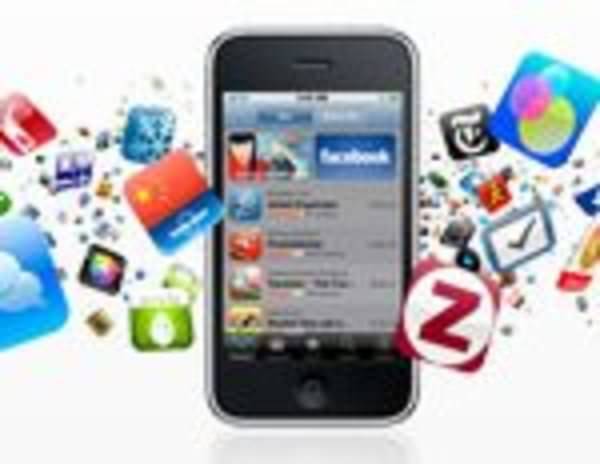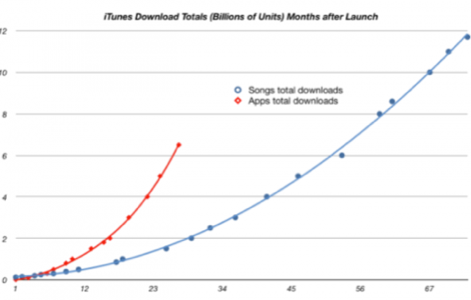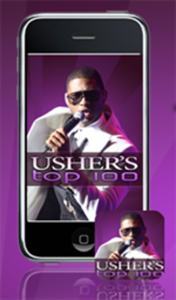There’s an interesting chart making its way around the Net this morning comparing the number of iTunes app downloads to the total downloads of songs. The surprising reveal is that it shows apps are being downloaded much more rapidly than songs. In only 2.2 years, the iTunes App Store has reached the same total downloads as the iTunes Music Store did after five years. And before the year is out, the two curves on the chart will be around the same height – 13 billion downloads each.

Why is this happening? Why are apps becoming more popular than music?
More Apps Downloaded Than Songs by Year-End
The original chart was posted on Asymco’s website, home to a hybrid industry analysis advisory and app development firm. Assuming the data the firm has collected is accurate (they say it comes from statements made by Apple representatives), Apple customers will have downloaded more iPhone/iPod/iPad apps than songs sometime in the near future, either by year end or just a few weeks later.

That’s a staggering thought, when you really think about it. After all, the original iPhone didn’t even support the development of third-party mobile applications when it launched in summer 2007. It wasn’t until March of the following year that Apple released development tools (the iPhone SDK, or software development kit), allowing aspiring developers to begin work on mobile creations that would run on an upcoming version of the iPhone operating system, due out later that summer.
When launched, however, these natively-built iPhone applications quickly became more popular the previously supported “Web applications” in terms of usage. App downloads surged and have been surging ever since.
But why are these apps, popular as they may be, on the path to besting music in terms of sheer download numbers?
Ouriel Ohayon, the creator of mobile application sharing and discovery platform AppsFire, has ventured a few guesses and we think he’s right on the money. Here are the reasons he puts forth on the AppsFire blog:
1. Apps Let You Personalize Your Phone
Apps let you personalize your phone in the same way as only ringtones and wallpapers once did. They are the new music playlists, in a sense, he says. In many ways I think that’s true – I know the first thing I do when I get hold of someone else’s mobile phone is look at what apps they’re using. I could care less what their musical interests are. However, I don’t think this is the main reason for the trend.
2.Many Apps are Free
Ohayon says that apps are surpassing music in part because so many of them are free. That’s hard to argue with. Apps are probably sampled more often because they’re free. However, some of those free apps probably aren’t used as often as the 99-cent song you knew you liked enough to purchase is listened to. Nor do free apps make up the majority of iPhone apps available for sale – roughly 70% are paid. Free apps cater to our desire to buy things on impulse, but without the guilt of throwing our money away. So what if you only play that game once? It was worth the price – nothing – to kill five minutes of time while in the waiting room of the doctor’s office.
3. Apps Provide Downloaded Music Substitutes
Mobile applications like Pandora, Last.fm, Deezer, Spotify, MOG and Rdio provide free and/or paid subscriptions to streaming music. You don’t need to download and pay for a song in iTunes if you use one of these applications – you can just listen to it over the Internet instead. Apple itself may have caught onto this trend, too. The company recently purchased streaming service Lala.com, which many suspect will be turned into a subscription-based, Internet music streaming service for iTunes.

In addition, some apps are music themselves. Ohayon points to apps like this Lady Gaga one or this Katy Perry one, for example, that package popular music within mobile applications. Some games also feature music like Katy Perry Revenge or Lyric Legend, which, when you think about it, is actually a new format for listening to music. But there are many, many others beyond the few mentioned here.
In fact, we spotted this trend nearly a year ago, noting the rise of “music-themed” apps that offer tunes and other content from artists. We then cited examples from NIN, Moby and Usher as artists who were using apps to promote their songs. (See: “Forget the iTunes LP, Apps are the New Album“). Still, the most devoted fans will probably buy both the app and the album, since only the latter usually works in playlists and when you go offline.
While no single reason can explain this trend in its entirety, the reasons put forth by Ohayon are reasoned and sound, we think. Asymco’s Horace Dediu agrees, responding to Ohayon via the comments of the post, saying “apps are indeed content,” referring to how apps can replace other forms of content. “Apps-as-media has implications in the way they are produced, marketed, priced and consumed,” writes Dediu. “All the data since has been nothing but confirmation of this.”

















